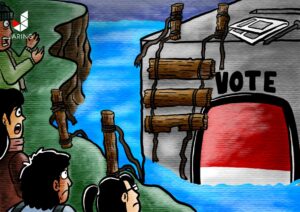The deliberation of the Job Creation Bill – which eventually got passed into law in early October 2020 – has caused a lot of civil society groups to raise their eyebrows due to some problematic contents comprised within the legal product.
Even before the bill was passed into law recently, many civil society activists who are part of the Indonesian People’s Fraction coalition had already voiced their opposition to the bill, since its contents could impact the environment, indigenous peoples’ community, fisherfolks community, women and the educational sector adversely.
After the bill has already been passed into law, it has become apparent that these activists need to continue their resistance to the law.
For instance, the National Mining Network Coordinator Merah Johansyah said that the articles in the job creation law could potentially accelerate environmental destruction. In the coal mining realm for instance, the law lifts the cap on land expansion limits on companies who plan to expand their businesses in Indonesia.
“Companies’ addiction on coal have been perpetuated by several incentives and procedural leeway. [The mining industry stakeholders] appear to normalize this [incessant need for coal] – which has become apparent when we look at the fact that some 127 members of the [job creation omnibus bill] task force are coal mining and mining businesspeople, leading to a conflict of interests,” Merah said during a press conference called Repeal the Omnibus Law indicated with an Indonesian language hashtag #Batalkanomnibuslaw conducted on Oct. 5.
According to Merah, the removal of the land expansion cap will alter the way that the government conducts its environmental impact assessment on local business operations. Previously, the assessment was conducted by taking into account the ecosystem risk factors associated with business operations. The new law has altered the focus on business profitability aspects instead; this is evident also in the removal of civil society group participation in the drafting of the environmental impact assessment, tipping the balance of the battles for space between civilians and businesspeople who do not give a damn about environmental destruction.
Speaking of battles for space, Archipelago Indigenous People Alliance activist Tommy Indyan, meanwhile, said that the job creations law could potentially worsen cases of land disputes among farmers and corporations. For instance, by prohibiting farmers to conduct land clearance through burning, businesspeople could potentially use the law to prosecute farmers.
In principle, this definitely runs counter with the constitution’s recognition and protection on the indigenous peoples stipulated on the 1945 Constitution’s articles 18 B (2) and 28 I (3), according to Tommy. On top of that, the new legal provision also runs counter to the International Labor Organization’s (ILO) convention no. 111/1958 which guarantees the freedom of the indigenous peoples’ rights to stay true to their way of living and working, which they have been practicing across multiple generations.
“Ideally, the government should treat traditional farmers and big corporations on equal terms. In addition, the government is also obliged to protect traditional farmers,” Tommy said.
On the other hand, the law has made punishment of companies which destroy and pollute the environment more lenient by changing the previously applied criminal charges into merely administrative punishments in terms of fines. Also, thanks to, or rather no thanks to, the law, now concession permit holders will no longer be held responsible for cases of forest fires and landscape changes.
“When concession permit holders are no longer held accountable for acts of negligence in their concession areas, then who will be held responsible for such acts of negligence? The indigenous peoples and farmers – there will be no doubt about it,” Tommy said.
The People’s Coalition for Fisheries Justice (Kiara) chairwoman Susan Herawati also voiced concern about the job creation law’s potential negative impacts on the lives on fisherfolks in coastal areas and small islands. For instance, she raised concerns over how the new law required traditional fisherfolks whose boats had a capacity of less than 10 gross tonnage (GT) to secure permits first before they were allowed to conduct their fishing activities.
“This new regulation has forced small fisherfolks to collide head on with the large ones, while also eliminating the government’s protection on the small fisherfolks,” Susan said.
She furthermore said that the contents of the job creation law attempted to strengthen the oceanic spatial management as regulated in the coastal and small islands zonation plan, which sidelined the role of fisherfolks – especially the female ones – from attempts to manage the ocean’s resources, despite the fact that these fisherfolks were the main actors of ocean management.
Getting deeper into the discussion of how the job creation law sidelined women’s role in the fisheries and agriculture sectors, an activist from the Solidaritas Perempuan (Women’s Solidarity) organization named Ariska said that the high conflicts involving battles for space among small farmers and fisherfolks against big business players oftentimes caused women who worked in these sectors to suffer from multiple layers of oppression.
Ariska went on to say that women’s land ownership rights would also decline significantly as the government tended to prioritize the needs of investors to underprivileged people.
“Besides, we can also expect to see a decline in protection on women laborers’ rights with the annulment of their rights to take period leave and miscarriage leave. Work agreement documents will only discuss two types of work leave – namely annual leave and sabbaticals,” Ariska said.
Besides being projected to have negative impacts on natural resources availability, some activists also believe that the job creation law will impact the national human resources development adversely.
In this vein, the student organization president of the Surakarta Sebelas Maret (March Eleventh) University in Solo, Central Java, M. Zainal Arifin said that the job creation law would further smoothen attempts to commercialize and privatize the education sector. Despite having annulled several chapters on the education sector from the bill, the recently passed law could still pave ways for potential commercialization attempts, justified through the government regulation.
“This is something which we consider most problematic – when the government attempts to negate its responsibility to elucidate the nation. Therefore, we will quash the job creation law, to have it repealed,” Zainal said.
Separately contacted, the Bandung Technology Institute student cabinet member Wicaksana said that the industrialization of the education sector could happen after the government had removed the word “non-profit” from the objectives of higher education in the new law. This, he said, ran counter to the Law No. 20/2003 on the National Education System, as well as Law No. 14/2005 and Law No. 12/2012 on Higher Education.
Wicaksana said the permit to run foreign higher education institutions at home would comprise the accreditation level of homegrown universities – especially when Indonesia finally annulled its higher education study program accreditation program.
The Indonesian Legal Ail foundation chairwoman Asfinawati, meanwhile, said she believed that the new job creation law did not guarantee the rights of laborers, farmers, fisherfolks, the indigenous peoples as well as women to also reap benefits from the nation’s natural resources potentials. On the contrary, the job creation law gives corporations bigger opportunities to destroy the environment and violate human rights.
Further, Asfinawati was slamming the government and national security apparatus for criminalizing public members who conducted mass strikes and protests to reject the job creation law. She said that the constitution guaranteed people’s rights to unionize, gather and express their opinions.
“We’ve conveyed our vote of no confidence to the House of Representatives and government. The people have demanded for them to repeal the job creation law,” she said.
The government did not heed any public objections to the job creation bill. The House of Representatives accelerated the signing of the bill from its initial date of Oct. 8 to Oct. 5, effectively passing it into law.







